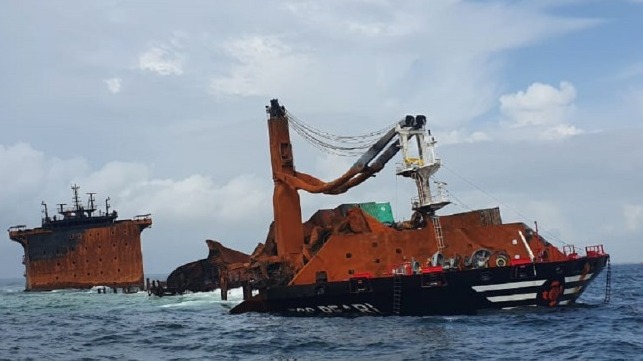Op-Ed: Green Shipping Must Go Beyond Decarbonization

The shipping industry is the backbone of global trade and supply chains, with 90 percent of all goods transported by the sea. The Suez Canal closure or logistical challenges due to the COVID-19 crisis have demonstrated our dependency on maritime supply chains.
Yet the shipping industry is also a major polluter. It contributes up to three percent to global CO2 and greenhouse gasses. Reducing these emissions is vital to reach the climate targets of the 2015 Paris agreement. Yet shipping was not included in the Paris Agreement. The basic problem: Since shipping implies the transfer of goods from one country to another, to which one should the emissions be attributed?
Drawing on the efforts at the main regulatory body for global shipping, the International Maritime Organization, at a new milestone in shipping’s green energy transition was achieved at the COP26 climate conference in Glasgow.
22 countries – including the United States, Japan, Germany, Britain, and France – signed the so-called Clydebank Declaration. The aim of the initiative: to establish ‘green shipping corridors’ – that is zero-emission maritime routes between two or more ports where ships using clean marine fuels can operate. This is a major logistical and technological challenge. It requires significant research and infrastructure investments to ensure the availability of green fuels such as methanol in participating ports along these corridors.
Yet the Clydebank Declaration is also a major governance challenge. A declaration is not a legally binding treaty through which states can be held accountable. The declaration also does not indicate who has the authority and oversight to secure funding, develop rules, and ensure compliance with green shipping standards. Will it be the IMO’s Marine Environment Protection Committee or another international body? Who will oversee and monitor progress?
Establishing green shipping corridors is crucial to reduce shipping’s greenhouse gas and CO2 emissions. But is this enough to “green” shipping? To address this question, we need to consider how climate change affects global shipping and maritime supply chains. Global warming will affect the oceans in many ways, including water temperatures, wind patterns, marine currents, and fish stocks. Yet global warming will also increase the intensity and frequency of storms at sea. This is a major threat to marine shipping and poses challenges for ocean governance.
Research by the U.S. National Aeronautics and Space Administration (NASA) suggests that climate change will lead to an increase in extreme weather over tropical oceans. NASA finds that there have been more category 4 and 5 hurricanes in the Atlantic in recent years. This increases the risk of dangerous shipping accidents that cause pollution and environmental catastrophes.
Shipping accidents and oil spills are already a major environmental problem. Such accidents occur more frequently than one might imagine. The European Maritime Safety Agency reported over 3,000 marine casualties and incidents and accidents in 2019, 63 of which resulted in significant pollution.
Two recent shipping accidents demonstrate the magnitude of the problem: The X-Press Pearl caught fire in June 2021. It eventually sank and polluted beaches and fishing grounds off Sri Lanka. One year before, an accident involving the MV Wakashio caused a major oil spill that destroyed pristine marine ecosystems off Mauritius – another island paradise. And just last month, about 588 barrels of oil leaked from a pipeline off California. The pipeline had been damaged by a ship anchor.
Decarbonizing shipping and other industries will reduce the harm from such accidents. Yet this will take decades, and in the meantime, ships will rely on fossil fuels to run their engines. Paradoxically, green fuels such as hydrogen (and natural gas) are also highly inflammable and could cause major accidents, including new forms of environmental damage which are not fully understood yet. Indeed, some commentators have referred to the new fuels as Frankenstein fuels, highlighting how poor our knowledge is of how these impact the environment or how the damage from spills can be contained.
The loss of containers at sea is another threat to the marine environment linked to climate change and extreme weather conditions at sea. The shipping giant Maersk lost over 1,000 containers in two incidents this year. The content of these containers and the potential damages they could cause remains unclear. Containers break up slowly over time and some of their content which may include toxic materials or plastic, will pollute deep sea ecosystems and shorelines. Maersk attributed both incidents to rough seas, a phenomenon that is likely to increase in the future due to climate change.
More efforts are needed to prevent and mitigate environmental disasters caused by climate-related marine and shipping accidents. One way to do this is by enhancing safety standards on vessels. Yet states also need to be better prepared to respond to shipping accidents and to contain oil spills and marine pollution. Building shipping accident response capabilities at the IMO and other organizations is vital to protect the marine environment against the effects of climate change and ensure that the costs of damage will not escalate.
What happens out at sea hardly gets the attention it needs. The shipping industry often is far remote from our daily lives. Greening shipping is vital to address climate change and rescue the oceans and its biodiversity. Green shipping corridors are an important step, but we need to think beyond the sheer logistics of providing fuels in ports and consider other sources of environmental harm related to global warming.
Christian Bueger is Professor of International Relations at the University of Copenhagen. His research focuses on global governance and international organization, the oceans and maritime security, international relations theory and the sociology of expertise.
Dr. Jan Stockbruegger is a Ph.D. graduate of the Department of Political Science at Brown University and an affiliate at the Climate Solution Lab at the Watson Institute for International and Public Affairs. His research focuses on maritime security, ocean governance and order-building at sea.
No comments:
Post a Comment